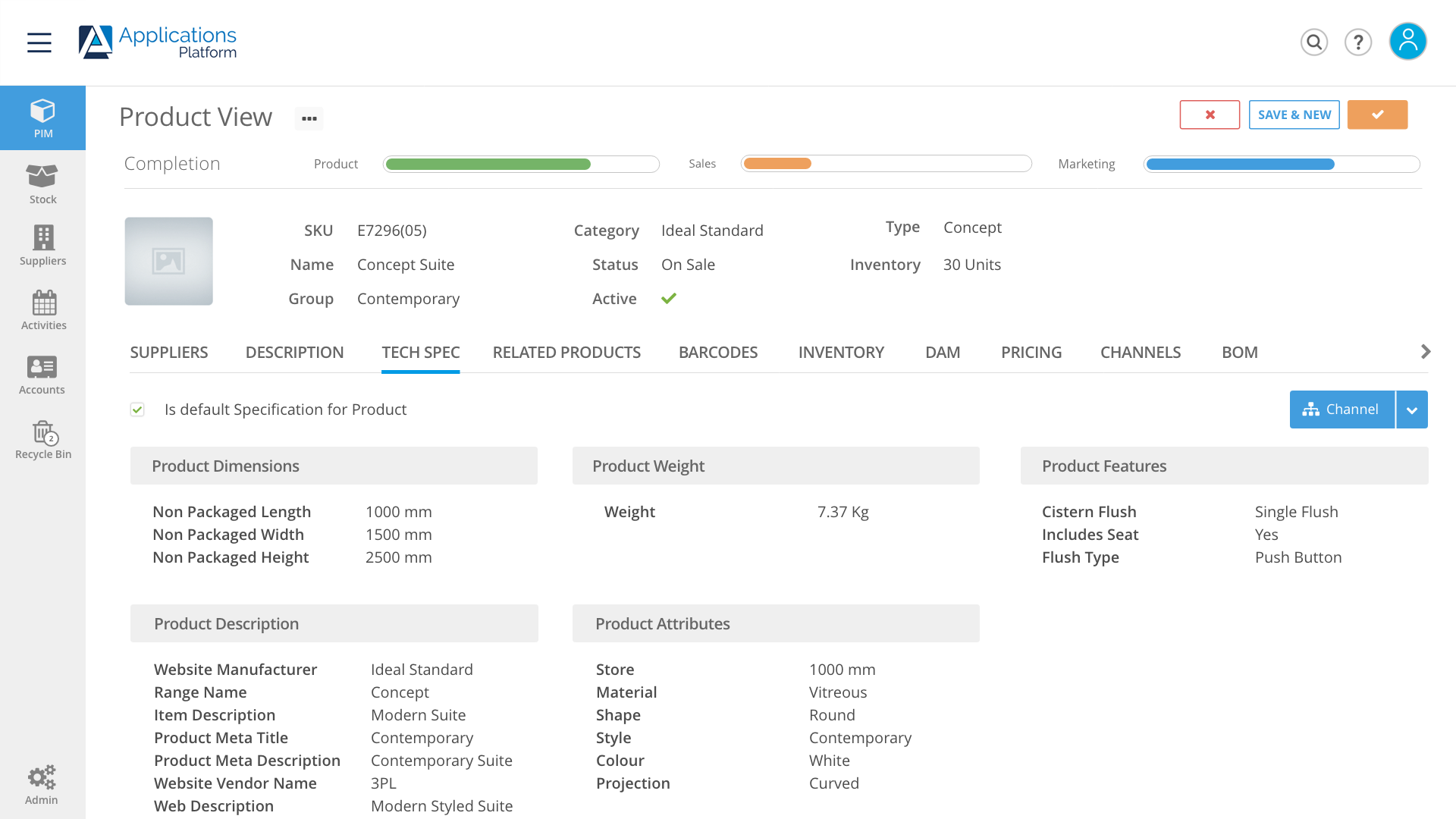In the landscape of eCommerce, maintaining accurate, consistent, and up-to-date product information is a key component for success. From streamlining data management to enhancing customer experiences, Product Information Management (PIM) software plays a pivotal role in modern business operations.
What is a PIM?
Product Information Management (PIM) software is a centralised platform designed to manage and store all product-related data within one database throughout an organisation. It serves as a repository for storing, organising, enriching, and distributing product information across various eCommerce channels.
PIM systems centralise all digital product data, including descriptions, technical specifications, images, pricing, manufacturer, SKUs, documents and marketing material.
PIM software allows both B2B and B2C organisations to manage their product catalogue by creating a single source of truth for product information and ensures data consistency across all sales channels.
Implementing PIM tools into your business strategy will help you to improve channel management by providing you with the ability to take full control over sales channels by simplifying the mapping of clean product data to multichannel environments such as 3PL, Amazon and eCommerce websites.
Who Uses PIM Software?
PIM software is used by a diverse range of B2B and B2C businesses across varying industries, including retailers, manufacturers, distributors, and wholesalers.
Large enterprises with extensive product catalogues or organisations managing over 15,000 SKUs through multiple suppliers often rely on PIM solutions to streamline data management processes. Small and medium-sized businesses increasingly adopt PIM software to scale their operations and maintain competitiveness in the market.
The key indicators that may signal the need to implement PIM software include:
- Management of a large volume of SKUs
- Increase in product returns and refund requests
- Inconsistent inventory levels – too high or too low
- Selling through multiple marketplaces and sales channels
- Have multiple product suppliers adding complex product data
- Have the need to share product information and data across departments, systems, and employees
- Wrong product descriptions and categorisation
- Frequently updating, adding, and removing new and existing product lines
Why Do Companies Need a PIM?
The need for PIM software varies from business to business. It can arise from several challenges businesses face in managing product information effectively. These challenges often drive the demand for PIM solutions and can include:
Data Fragmentation:
Without a centralised PIM system, product information is often scattered across multiple spreadsheets, databases, and departments, leading to inconsistencies and errors. This can reduce employee and company productivity and stagnate company growth.
Scalability:
As businesses grow and diversify their product catalogues, managing product data manually becomes increasingly complex and time-consuming. PIM tools enable you to scale operations up or down depending on business needs and requirements at any given time.
Multi-channel Distribution:
With the increase of available online marketplaces, social media platforms, and mobile apps, businesses must ensure that product information is consistent and optimised for each channel. A PIM solution improves the management of multi-channel distribution and ensures data consistency across all platforms.
Customer Experience:
Accurate and detailed product information is crucial for enhancing customer trust, driving conversions, and reducing returns. A PIM system helps to improve product descriptions, categorisation, and consistency. Each element helps to improve the customer experience and enhances customer satisfaction, resulting in increased sales from returning customers and reduced product returns.
What is PIM in eCommerce?
In eCommerce, PIM software plays a pivotal role in managing product data across various online channels such as Amazon, eBay, OnBuy and company eCommerce stores.
Product information management improves search product visibility, enhances product discoverability, and delivers personalised shopping experiences to the end-user, whilst eCommerce platforms require rich and standardised product data.
PIM systems integrate seamlessly with eCommerce platforms such as Shopify, WooCommerce, Magento, BigCommerce and online marketplaces, enabling businesses to dynamically synchronise product information to multiple channels in pseudo real-time. Integration can be extended to integrating primary business software such as an ERP system for end-to-end automation.
How Does PIM Work?
PIM software operates through a series of interconnected processes aimed at centralising and optimising product data management. These interconnected processes can include:
Data Collection:
Product information is gathered from internal sources such as ERP systems, CSV file imports, suppliers, and manufacturers.
Data Enrichment:
Product data is enriched with additional attributes, such as images, videos, translations, and marketing content, to enhance its quality and relevance.
Data Standardisation:
PIM systems standardise product data according to predefined rules and guidelines, ensuring consistency across all channels.
Data Syndication:
Enriched and standardised product data is distributed to various sales channels, including eCommerce websites, marketplaces, mobile apps, and print catalogues.
Data Governance:
PIM software provides tools for data quality management, version control, access control, and compliance with regulatory requirements.
Video: Finding your way around PIM from Applications Platform.
Benefits of PIM
Implementing PIM software offers a wide array of benefits for businesses looking to enhance their product information management processes. These PIM benefits include:
Centralised Data Management:
PIM systems provide a single source of truth for all product-related information, facilitating easier access, updates, and distribution.
Improved Data Quality:
By standardising and enriching product data, PIM software enhances data accuracy, completeness, and consistency, leading to better customer experiences and increased sales.
Enhanced Efficiency:
Automation of manual tasks such as data entry, validation, and syndication streamlines workflows and reduces time-to-market for new products.
Scalability:
PIM solutions are scalable, allowing businesses to accommodate growing product catalogues and expanding sales channels without sacrificing performance or data integrity.
Cross-channel Consistency:
PIM software ensures that product information remains consistent and up-to-date across all sales channels, promoting brand coherence and customer trust.
Personalised Marketing:
Rich product data enables businesses to deliver targeted and personalised marketing campaigns based on customer preferences, behaviour, and demographics.
Key Components of PIM Software
When evaluating PIM solutions for eCommerce product information management, several key components should be considered:
Scalability:
The ability of the PIM system to handle large volumes of product data and support the growth of the business and changing requirements over time.
Data Integration:
Seamless data integration with existing business systems such as ERP, CRM, and eCommerce platforms to ensure seamless data flows.
Customisation:
Flexibility to tailor the PIM software to meet specific business requirements, including custom data fields, workflows, and user permissions.
PIM Vendor Support and Services:
Availability of comprehensive support services, including implementation assistance, training, ongoing maintenance, and technical support.

Image: PIM Product View.
Challenges and Trade-offs
While PIM software offers numerous benefits, implementing and managing a PIM solution also presents challenges and trade-offs. Common challenges often faced by organisations looking to implement PIM software include:
Cost:
Investing in PIM software involves upfront costs for licensing, implementation, and training, which may be prohibitive for some businesses.
Complexity:
Implementing a PIM system requires careful planning, data migration, and change management processes, which can be complex and time-consuming.
Data Governance:
Maintaining data quality, consistency, and compliance requires ongoing effort and resources, including data cleansing, validation, and governance processes.
User Adoption:
Ensuring widespread adoption of PIM software among employees requires adequate training, communication, and support to overcome resistance to change.
Vendor Lock-in:
Selecting the right PIM vendor is crucial, as switching between PIM systems can be challenging and costly due to data migration and integration issues.
The Impact of PIM Solutions
Effective product information management can have a profound impact on various aspects of day-to-day business operations. The impact of adding a dedicated PIM system to your technology stack include:
Competitive Advantage:
By providing accurate, consistent, and enriched product information, businesses can differentiate themselves from competitors and attract more customers.
Operational Efficiency:
Streamlining data management processes through a PIM application reduces manual errors, eliminates redundant tasks, and frees up employee resources for strategic initiatives.
Customer Satisfaction:
High-quality product information enhances the online shopping experience, leading to increased customer satisfaction, loyalty, and repeat purchases.
Strategic Operational and Business Growth:
Scalable PIM solutions enable businesses to expand their product offerings, enter new markets, and seize growth opportunities with confidence.
Product Information Management (PIM) software is a vital tool for businesses looking to optimise their eCommerce product information management processes. By centralising, standardising, and enriching product data, PIM software solutions empower businesses of all sizes to improve operational efficiency, enhance customer experiences, and drive business growth plans. However, implementing and managing a PIM solution requires careful consideration of various factors, including scalability, data integration, customisation, vendor support, and the impact on business operations. By proactively addressing these challenges and trade-offs, businesses can unlock the full potential of PIM software and gain a competitive advantage in the dynamic eCommerce landscape.
Our Professional Services team is at hand to help you simplify your PIM project including the planning, development, customisation, and deployment so that you can go to market quickly, on time and within budget. Our dedicated integration engine simplifies migration and synchronisation of data between systems.
For more information or to discuss your PIM requirements contact us below.

